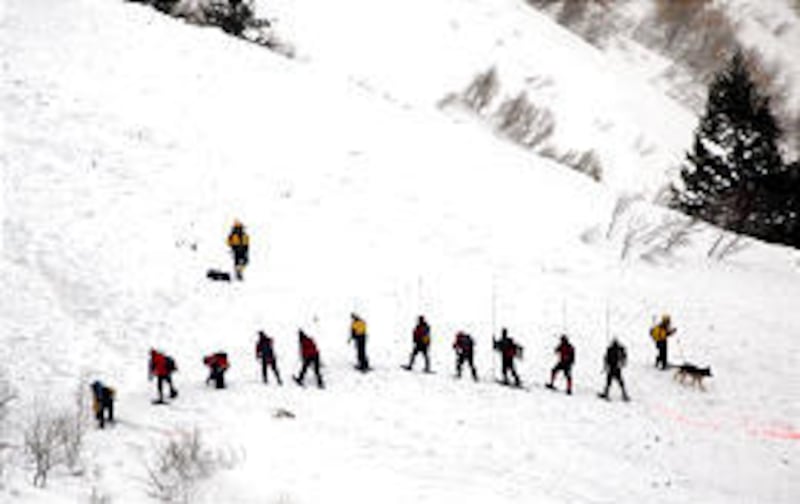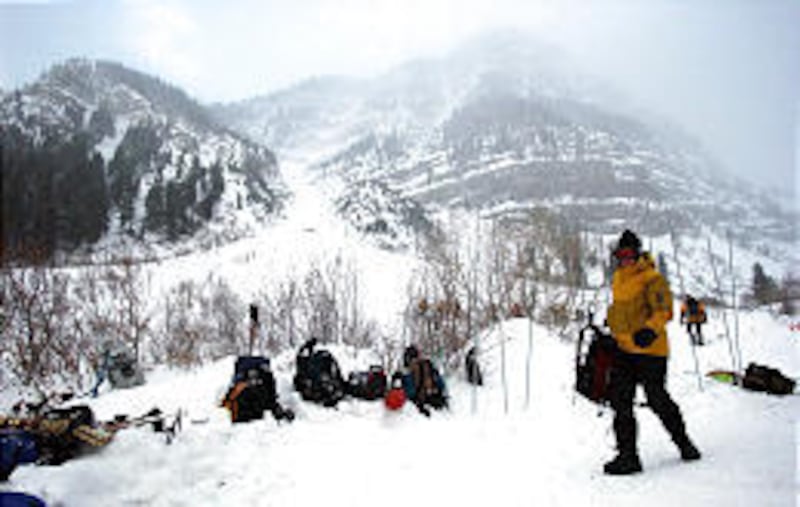It came in a blast of white.
And then the world went black.
On Dec. 26 of last year at about 4:30 p.m. a massive avalanche roared down a Provo Canyon mountainside and swallowed three snowboarders. Two friends riding with them were partially buried but survived.
In the year since the fatal accident, the friends and families of Adam Merz, 18; Michael Hebert, 20; and Rod Newbury, 20, have tried to move on in a world that will never again feel whole. The boys left behind brothers and sisters, mothers and fathers.
Newbury left behind a son he will never know — his fiancee, who was pregnant last December, gave birth to their child this summer.
She named the boy after his dad.
"It's hammered people pretty good," says Craig Knight, a close friend of the Merz and Hebert families. "The next couple weeks will be especially tough."
For some in the Merz, Hebert and Newbury families, the holidays have become a dreaded season, where painful emotions and buried memories come to the surface.
Family members have struggled to make sense of what happened that day.
As one mother says, "Only God can create an avalanche."
"We've had to ask ourselves some tough questions," says Mona Merz. "Something like this tests your faith."
Adam Merz and Michael Hebert came from the same Orem neighborhood. Newbury lived in Pleasant Grove with two friends, J.D. Settle and Matt Long. They formed a tight-knit group that relished outdoor adventure.
On the day after Christmas, the day after Newbury turned 20, the group of five set off for Provo Canyon. Other friends who had planned on going that day stayed home.
The boys ended up snowboarding below Elk's Point, a dangerous avalanche chute near Aspen Grove. Settle would later say they were aware of the risk, but with so many feet of fresh powder they couldn't resist.
At about 4:25 p.m., the group stopped to take a break. And that's when the first of four avalanche slides broke from the mountain.
To Settle it sounded like an earthquake.
"I've never seen anything like it," Settle would recall. "It looked like pure white coming at us."
A family snowshoeing near the bottom of the mountain saw the avalanche carry the boys about a half-mile down the narrow chute.
Settle was buried up to his neck. Long lay below a foot of snow.
"You can't believe the panic you feel," says Utah Sen. John Valentine, R-Orem, a volunteer searcher who worked at the rescue and recovery operation. He has been buried in an avalanche.
"You're buried in snow, you can hear people talking, but you holler and no one can hear you. Snow is such a great insulator."
With help from others on the mountain, Long and Settle dug themselves from the snow and began looking for their friends. They would never find them.
Settle is tormented by voices calling for help, Merz says. She has assured him that it is impossible that her son or others trapped in the snow called for him because all indications point to an instant death caused by head trauma.
Other friends who did not make the trip that day have visited Merz blaming themselves. Perhaps if they had gone they could've found their buried friends, they say.
"It's really taken its toll," Merz says. "A lot of the friends feel guilt. They try to make sense of it, but they feel hurt and betrayed."
That hurt has manifested itself in different ways. Pleasant Grove police say Settle began shooting out car windows with a pellet gun the day after the accident. In one month, he shot out the windows of more than 200 cars in Pleasant Grove, Lindon, American Fork and Orem with two friends, police say.
He was arrested Jan. 24 after firing a weapon at an oncoming vehicle. That vehicle was an unmarked patrol car of a Pleasant Grove police officer.
In October, he was sentenced to three years probation and 60 days in the Utah County Jail.
"I think J.D.'s anger over what happened came out in crazy ways," Merz says. "It was his way of venting."
Even hardened rescue workers have been unable to shake the memories of that day.
"You can't engage in search and rescue for 24 years and not have some weigh on you a little bit," Valentine said.
For Utah County Sheriff Sgt. Tom Hodgson, who also helped in the search, the hardest part was returning to the parking lot near Aspen Grove at the end of each day to tell the waiting families they hadn't found anything.
Finding three bodies in an an avalanche field 1,900 feet long, 920 feet wide at the base, and 34- to 36-feet deep in some places proved extremely difficult.
"It was a painstaking effort and it affected a lot of us because we felt like we hadn't done our jobs," Hodgson says. "We'd go down the mountain with grim faces and say, 'Not today.' The families would reassure us that we were doing all we could, but we didn't feel like we were doing our jobs."
Hebert's body was found two days after the avalanche, about 1,000 feet from where it began.
Since the avalanche, families of the three boys have become closer. Mona Merz attended a baby shower for Newbury's fiancee.
"We grieve together. We've shared something uncommon," she says. "But at the same time we don't want it to define us. We were good friends and neighbors before, and we've continued to be a part of each other's lives."
The Merz family has agreed to speak at avalanche awareness classes now being developed by the Utah Avalanche Center and the Utah County Sheriff's Office. The classes will be taught at local schools.
"You hear about these avalanches, and you wonder if it's happening more or if we're just more sensitive to it, so we notice," Merz says. In the last month three separate avalanches have killed four men. "But it seems like it's happening more."
Valentine and Hodgson say with the rise in such extreme sports as snowboarding — and the increasing popularity of snowmobiles — more people than ever before are at risk of being caught in an avalanche.
"These beautiful mountains need respect," Valentine says. "Because of clothing and machines we have an ability to get into these backcountry areas, but it doesn't mean the mountains are going to be forgiving."
Valentine says outdoors enthusiasts should educate themselves about the dangers of avalanches and check with the Utah Avalanche Center before venturing into backcountry.
Avalanche danger is monitored by the group and available daily at www.avalanche.org or by calling 801-364-1581.
For Merz and others, the pain of what happened the day after Christmas last year will never go away.
"It's not something you get over. We'll just never be the same," Merz says. "But you have a choice. You can blame God or love him and say 'I will do the very best I can.' "
"You can remain a victim and keep blaming, or you can do extraordinary things."
The choice Merz's family has made is to celebrate Adam's life by going cross-country skiing the day after Christmas in memory of their son and brother.
"It's what Adam would have wanted," she says.
E-mail: jhyde@desnews.com







